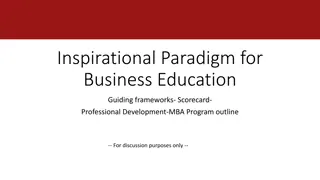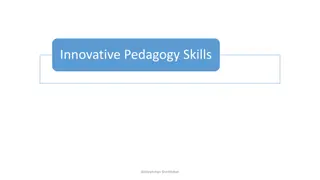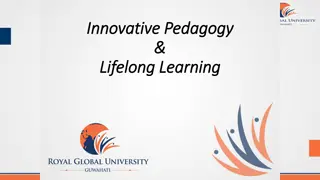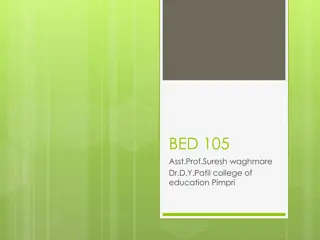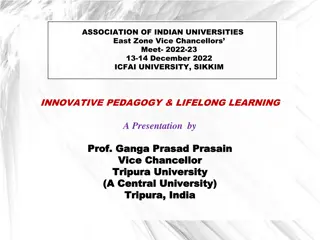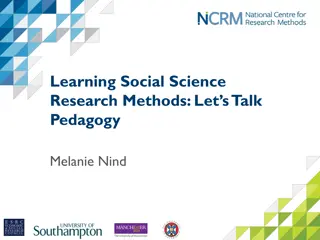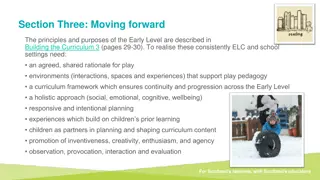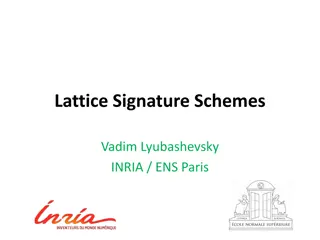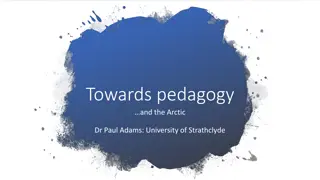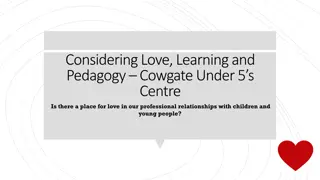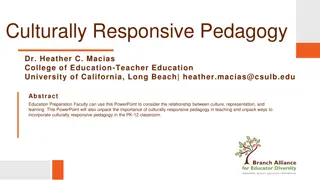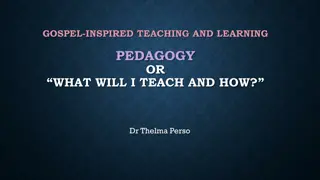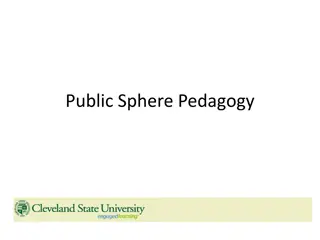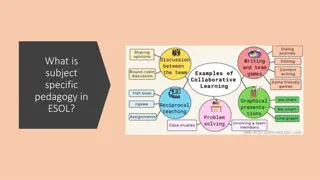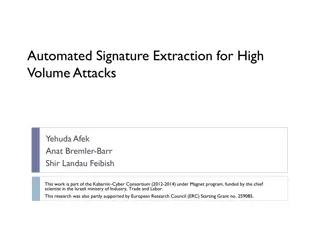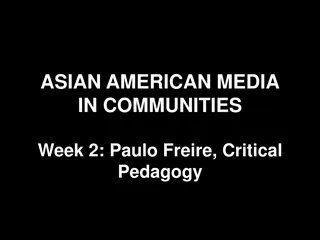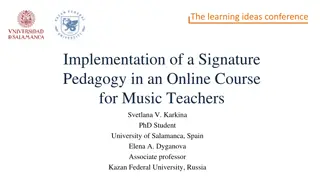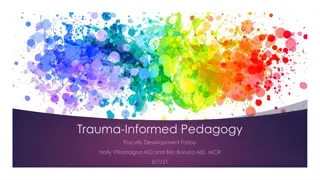Exploring Ignatian Pedagogy as a Signature Approach in Education
Ignatian Pedagogy, rooted in the Jesuit tradition, focuses on holistic education by emphasizing Context, Experience, Reflection, Action, and Evaluation. This approach aims to create compassionate and socially aware learners who contribute positively to society. By personalizing learning and promoting transformative action, Ignatian Pedagogy shapes responsible leaders and fosters a sense of social justice in education.
Download Presentation

Please find below an Image/Link to download the presentation.
The content on the website is provided AS IS for your information and personal use only. It may not be sold, licensed, or shared on other websites without obtaining consent from the author. Download presentation by click this link. If you encounter any issues during the download, it is possible that the publisher has removed the file from their server.
E N D
Presentation Transcript
Signature Pedagogy Center for Teaching and Learning Spring 2022
Initial Questions 1.) What signature pedagogy/pedagogies influenced you in your own educational experience? When you look back on your own education, what pedagogical methods, tools, and techniques influence your own pedagogical practices today? Note: Those pedagogical styles and methods need not have only "positive" effects. 2.) What do students say, or do you think they say, to their peers about what it's like to have a class with you? Note patterns from MOCES, student notes to you, or what you hope they think about the educational experience they have in your class.
Ignatian Pedagogy as Signature Pedagogy Ignatian Pedagogy is in and of itself a signature pedagogy in the Jesuit education tradition with its focus on the whole person along with the themes of Context, Experience, Reflection, Action and Evaluation. Context: the lectures, assignments, in-class work make efforts in understanding the students context and better understanding from where they came, what/who matters to them, and the lens through which they look at things. Experiences are given both inside and outside the classroom and differentiated to respect all learners. Reflection is done in a flexible manner based on the dynamics of each class and goes deeper and beyond what did you learn with this content? Evaluation is done orally and in written forms and supports the action after the learning is done. From BrigittaErlita Tri Anggadewi,TimotiusMariaRadityaHernawa, Marcellinus Andy Rudhito, Danang SatriaNugraha, Maria Josepha RetnoPriyani. Lecturers Perspectives onIgnatian Pedagogy. Advances in Social Science, Education and Humanities Research, volume 399 International Conference on Educational Psychology and Pedagogy (ICEPP 2019).
So What? IPP makes student aware of not just what they can gain from receiving an education, but how their attainment of knowledge can better serve society and the global community. In other words, it steers away from creating competitors to creating compassionate, conscience, and competent students. IPP is a powerful tool for social justice education and can aide in creating socially aware thinkers and leaders. It personalizes learning and promotes transformative action to create leaders who will practice responsible citizenship. The signature pedagogy of Jesuit education is not limited to any one academic discipline but provides a "way of proceeding (Mountin, Nowacek, 2012). The concept of signature pedagogies is premised on the idea that different disciplines and professions entail distinct ways of knowing and doing. There are, in Shulman's words, "characteristic forms of teaching and learning" in which "novices are instructed in critical aspects of the three fundamental dimensions of professional work-to think, to perform, and to act with integrity" (2005, p. 52). From Mountin, Susan and Nowacek, Rebecca, "Reflection in Action: A Signature Ignatian Pedagogy for the 21st Century" (2012). Theology Faculty Research and Publications. 177. https://epublications.marquette.edu/theo_fac/177
What is a "signature pedagogy?"
Signature Pedagogy: History and Context (Melissa) * From Lee Shulman's 2003 article: Signature pedagogies are the forms of instruction that leap to mind when we think about the preparation of members of a particular profession (p. 52). * They implicitly define what counts as knowledge in a field and how things become known. They define how knowledge is analyzed, criticized, accepted, or discarded. They define the functions of expertise in a field, the locus of authority, and the privileges of rank and standing (p. 54).
Structures of Signature Pedagogies Surface structure: The concrete, operational acts of teaching and learning, of showing and demonstrating, of questioning and answering, of interacting and withholding, of approaching and withdrawing (pp. 54-55). Deep structure: A "set of assumptions about how best to impart a certain body of knowledge and know-how (p. 54). Implicit structure: A "moral dimension that comprises a set of beliefs about the professional attitudes, values, and dispositions (p. 54).
Why a signature pedagogy *now*? Pandemic times and meeting students' needs now Reinvigorate teaching (revisit statement of teaching philosophy: What has changed? What do you want to keep?) Professional development (tenure file, professional websites, etc.) Individual/departmental reflection to identify patterns, strengths, and trends to communicate to students Connections to Ignatian Year and elements of Catholic teaching (UAPs, etc.) Personal growth and reflection
Steps to a signature pedagogy 1.) Note underlying philosophical commitments you make, or want to make, as an educator: What drives your teaching? How do you understand your teaching to be connected to your specific discipline? 2.) Identify what kinds of educational experiences you want students to have as a result of your classes: Why these experiences? How do they connect to your discipline specifically? 3.) Articulate methods (ways) to achieve those experiences: What does learning in your classes look like? What do students do? Why?
Examples of pedagogical methods Active learning, whereby students develop skills using higher-order thinking; Experiential learning, whereby students learn by doing; Inquiry-based learning, whereby students research and direct at least some of their own learning; Problem-based learning, whereby students learn skills and concepts through "real world" problem-solving; Project-based learning, whereby students collaborate to solve problems creatively. *Can use a variety of methods, of course. * Which is most customary in your discipline? Why? Which might you want to pursue? Why? Which are most suitable to you as an educator? Why?
Steps to Writing a Signature Pedagogy Identify 1-3 fundamental, non-negotiable commitments that you make as an educator in any/all of your classes. Identify 1-3 fundamental, non-negotiable goals that you have for your students in any/all of your classes. Identify 3-5methods that you use to connect commitments to goals. Keep in mind what students experience in your classes (what they do experience, or what youaim for them to experience). Always keep in mind *why* you are choosing these methods that is, how they directly connect to and illustrate your fundamental pedagogical commitments and your desires for students in and after your classes.
To generate ideas... What would people see if they look in your classroom? What are students be doing? What are you doing? Why? What might be discipline-specific about your pedagogy? Where and how does learning take place for your students? What resources and tools beyond learning the content of the class are you asking students to make use of and learn? (e.g., research, digital scholarship, multimedia, etc.) What do you want to try in the future to bring your foundational commitments to life? What would it take to help you do so? Consider what you talk about with friends/colleagues: What do they say you obviously care about in your teaching?
Additional Resources and Scholarship CTL folder with Signature Pedagogy resources Penn State s Center for Teaching and Learning: https://www.schreyerinstitute.psu.edu/pdf/DecodingDisciplines_InSITEs.pdf
Examples of Signature Pedagogies Elon's Philosophy Department Penn State s Center for Teaching and Learning: https://www.schreyerinstitute.psu.edu/pdf/DecodingDisciplines_InSITEs.pdf


